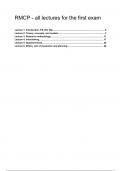RMCP - all lectures for the first exam
Lecture 1: Introduction, PS, RO, RQ.................................................................................... 2
Lecture 2: Theory, concepts, and models............................................................................7
Lecture 3: Research methodology..................................................................................... 11
Lecture 4: Interviewing........................................................................................................ 17
Lecture 5: Questionnaires...................................................................................................24
Lecture 6: Ethics, role of researcher and planning.......................................................... 29
,Lecture 1: Introduction, PS, RO, RQ
What are complex problems?
● Unpredictable
● Uncertain
● Problems are multi-dimensional
Multiple actors/stakeholders
● Academic vs non-academic stakeholders
Different conflicting
● Factors
● Values
● Perspectives
Various:
● Rules & regulations
● Management
● Markets
Different perceptions:
● Problem definitions
● Problem roots
● Solutions
Research..
“Research is something that people undertake in order to find out things in a systematic way,
thereby increasing their knowledge.”
Goals of this lecture are to introduce you to:
● Understand the internal consistence of research design elements
● Formulating a research objective
● Formulating a main research question
How to study real world research.
For some problems we cannot measure anything, but you have to understand the problem
and have to observe, listen.
● Transforming the world (Action research, transdisciplinary research)
● Understanding the world (Case study, ethnography)
● Measuring the world (Survey research, experimental research)
2
,Transdisciplinary research: also using non-academic environment, listen to others, outside
of
Interdisciplinary research: using each others methods, outside of your own level of
expertise
Multidisciplinary: Multiple methods, but they not integrate
Real world research
● Society is our laboratory
● Doing research in an uncontrolled environment
● We focus on change.
● What do I need in order to solve complex problems?
● What skills do I need to solve problems
Designing real world research:
● Why: My contribution, what i want to
achieve
● What: My research area, the concept I will
study
● How: How to proceed, the way I collect
material and the way I analyze it
Designing is an iterative process!
Principles of doing research
1. Research is being a designer.
Designing is defining and refining. New insights help to revise your definitions.
Iterative process - of coming to understand your research object.
2. Problematizing
● Not taking anything for granted, curiosity
● Ask implicit questions (deeper roots of problem)
● Practical and theoretical relevance
3. Interpreting is relating to your data
● Are interpretation steps standardized?
● Standardization of interpretation steps is impossible..?
● Interpretation steps have to be made explicit (perspective)
● Are you aware of your role as a researcher?
3
, Selecting a research topic
What is a good research topic?
● Interesting
● Meet academic requirements
● Accessible information, material & data
Avoid research disasters:
● Too small or too big
● Too easy or too trivial
● Lack in resource materials and people
Research topic
- Every research starts with a problem, a relevance
- There is also a problem owner
→ e.g.: Primary school teachers notice that more of their students are overweight. They
wonder whether they, as educators, should take action.
● Causes of overweight
● Risk/effect of overweight on children
● Impact on curriculum
● Responsibilities of primary teachers
Research topic → provides knowledge, insight, information → contributes to problem
solving, addressing a situation → has practical and theoretical relevance → research
objective
Research objective
Quality criteria for effective RO:
● Useful (relevance)
● Realistic
● Feasible (time, knowledge, resources)
● Clear
● Informative
Demarcation is key (otherwise unfeasible, invalid, unreliable results)
The research objective is (a) by (b)..
a) External objectives = contribution of your research project to solution of the
problem / what results can be expected
4






